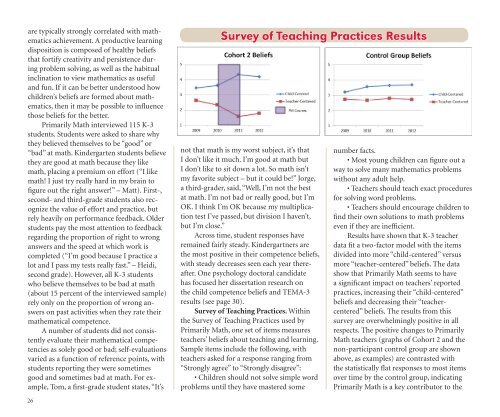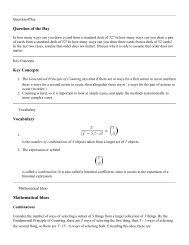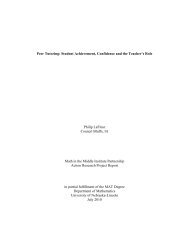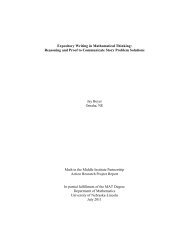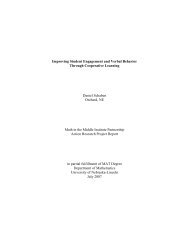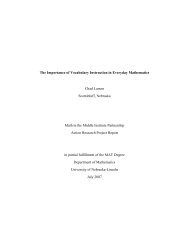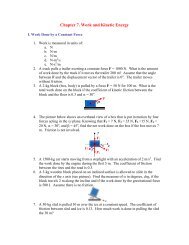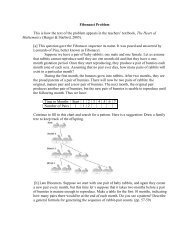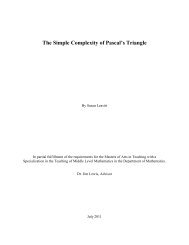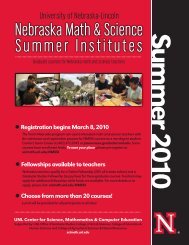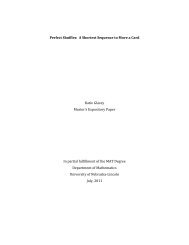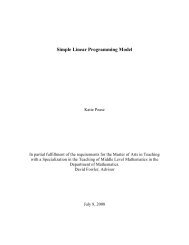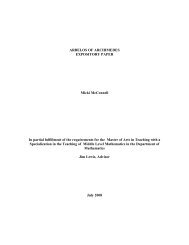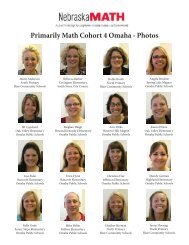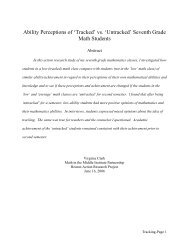Primarily Math - Center for Science, Mathematics & Computer ...
Primarily Math - Center for Science, Mathematics & Computer ...
Primarily Math - Center for Science, Mathematics & Computer ...
Create successful ePaper yourself
Turn your PDF publications into a flip-book with our unique Google optimized e-Paper software.
are typically strongly correlated with mathematics<br />
achievement. A productive learning<br />
disposition is composed of healthy beliefs<br />
that <strong>for</strong>tify creativity and persistence during<br />
problem solving, as well as the habitual<br />
inclination to view mathematics as useful<br />
and fun. If it can be better understood how<br />
children’s beliefs are <strong>for</strong>med about mathematics,<br />
then it may be possible to influence<br />
those beliefs <strong>for</strong> the better.<br />
<strong>Primarily</strong> <strong>Math</strong> interviewed 115 K-3<br />
students. Students were asked to share why<br />
they believed themselves to be “good” or<br />
“bad” at math. Kindergarten students believe<br />
they are good at math because they like<br />
math, placing a premium on ef<strong>for</strong>t (“I like<br />
math! I just try really hard in my brain to<br />
figure out the right answer!” – Matt). First-,<br />
second- and third-grade students also recognize<br />
the value of ef<strong>for</strong>t and practice, but<br />
rely heavily on per<strong>for</strong>mance feedback. Older<br />
students pay the most attention to feedback<br />
regarding the proportion of right to wrong<br />
answers and the speed at which work is<br />
completed (“I’m good because I practice a<br />
lot and I pass my tests really fast.” – Heidi,<br />
second grade). However, all K-3 students<br />
who believe themselves to be bad at math<br />
(about 15 percent of the interviewed sample)<br />
rely only on the proportion of wrong answers<br />
on past activities when they rate their<br />
mathematical competence.<br />
A number of students did not consistently<br />
evaluate their mathematical competencies<br />
as solely good or bad; self-evaluations<br />
varied as a function of reference points, with<br />
students reporting they were sometimes<br />
good and sometimes bad at math. For example,<br />
Tom, a first-grade student states, “It’s<br />
Survey of Teaching Practices Results<br />
not that math is my worst subject, it’s that<br />
I don’t like it much. I’m good at math but<br />
I don’t like to sit down a lot. So math isn’t<br />
my favorite subject – but it could be!” Jorge,<br />
a third-grader, said, “Well, I’m not the best<br />
at math. I’m not bad or really good, but I’m<br />
OK. I think I’m OK because my multiplication<br />
test I’ve passed, but division I haven’t,<br />
but I’m close.”<br />
Across time, student responses have<br />
remained fairly steady. Kindergartners are<br />
the most positive in their competence beliefs,<br />
with steady decreases seen each year thereafter.<br />
One psychology doctoral candidate<br />
has focused her dissertation research on<br />
the child competence beliefs and TEMA-3<br />
results (see page 30).<br />
Survey of Teaching Practices. Within<br />
the Survey of Teaching Practices used by<br />
<strong>Primarily</strong> <strong>Math</strong>, one set of items measures<br />
teachers’ beliefs about teaching and learning.<br />
Sample items include the following, with<br />
teachers asked <strong>for</strong> a response ranging from<br />
“Strongly agree” to “Strongly disagree”:<br />
• Children should not solve simple word<br />
problems until they have mastered some<br />
number facts.<br />
• Most young children can figure out a<br />
way to solve many mathematics problems<br />
without any adult help.<br />
• Teachers should teach exact procedures<br />
<strong>for</strong> solving word problems.<br />
• Teachers should encourage children to<br />
find their own solutions to math problems<br />
even if they are inefficient.<br />
Results have shown that K-3 teacher<br />
data fit a two-factor model with the items<br />
divided into more “child-centered” versus<br />
more “teacher-centered” beliefs. The data<br />
show that <strong>Primarily</strong> <strong>Math</strong> seems to have<br />
a significant impact on teachers’ reported<br />
practices, increasing their “child-centered”<br />
beliefs and decreasing their “teachercentered”<br />
beliefs. The results from this<br />
survey are overwhelmingly positive in all<br />
respects. The positive changes to <strong>Primarily</strong><br />
<strong>Math</strong> teachers (graphs of Cohort 2 and the<br />
non-participant control group are shown<br />
above, as examples) are contrasted with<br />
the statistically flat responses to most items<br />
over time by the control group, indicating<br />
<strong>Primarily</strong> <strong>Math</strong> is a key contributor to the<br />
26


